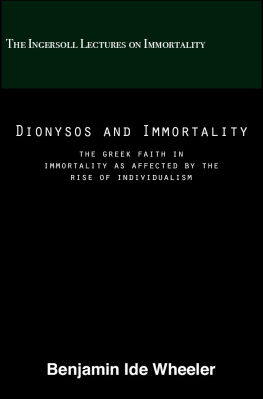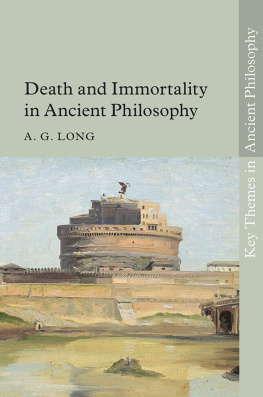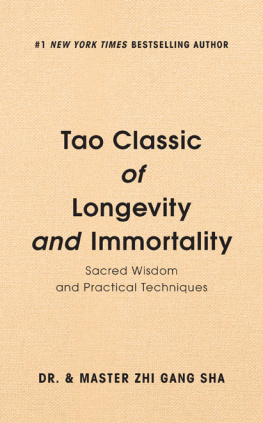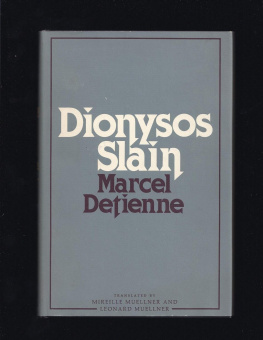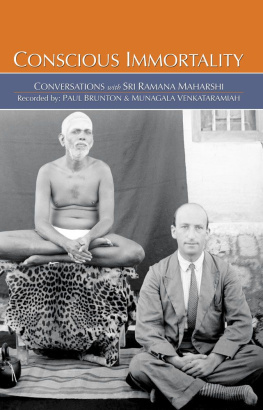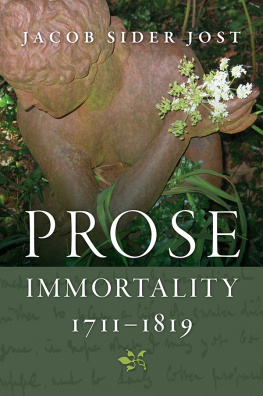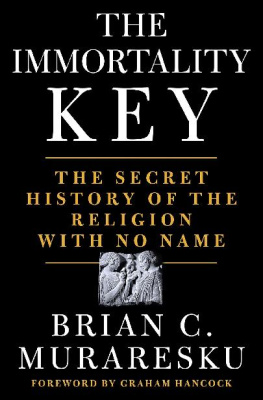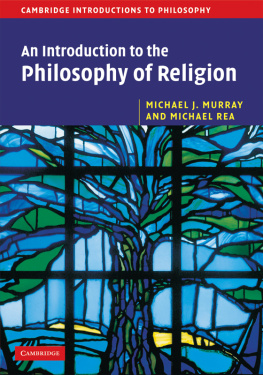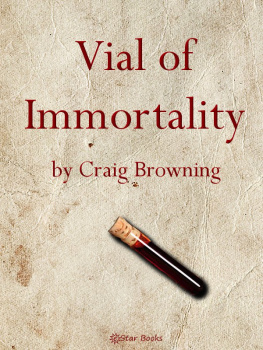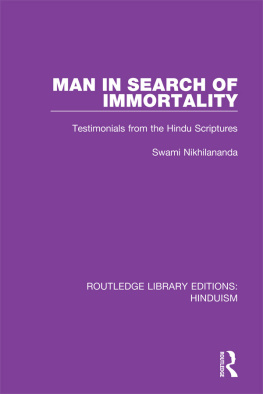| Dionysos and Immortality |
| Benjamin Ide Wheeler |
| Libre Dionysia (2018) |
|
| Tags: | Non-Fiction, Philosophy, Spirituality |
| Non-Fictionttt Philosophyttt Spiritualityttt |
Greek religion, immortality, and the role Dionysos played in bridging the two. Benjamin Wheeler delivered this lecture in 1899 as part of the "Ingersoll Lectures on Immortality".
COPYRIGHT, 1899, BY BENJAMIN IDE WHEELER ALL RIGHTS RESERVED
Conversion, 2018, Libre Dionysia
Libre Dionysia - Making texts available and e-reader friendly. All ePubs are manually generated and editied from sourced PDF files or physical books.
THE INGERSOLL LECTURESHIP
Extract from the will of Miss Caroline Haskell Ingersoll, who died in Keene, County of Cheshire, New Hampshire, Jan. 26, 1893.
First. In carrying out the wishes of my late heloved father, George Goldthwait Ingersoll, as declared by him in his last will and testament, I give and bequeath to Harvard University in Cambridge, Mass., where my late father was graduated, and which he always held in love and honor, the sum of Five thousand dollars ($5,000) as a fund for the establishment of a Lectureship on a plan somewhat similar to that of the Dudleian lecture, that is one lecture to be delivered each year, on any convenient day between the last day of May and the first day of December, on this subject, the Immortality of Man, said lecture not to form a part of the usual college course, nor to be delivered by any Professor or Tutor as part of his usual routine of instruction, though any such Professor or Tutor may be appointed to such service. The choice of said lecturer is not to be limited to any one religious denomination, nor to any one profession, but may be that of either clergyman or layman, the appointment to take place at least six months before the delivery of said lecture. The above sum to be safely invested and three fourths of the annual interest thereof to be paid to the lecturer for his services and the remaining fourth to be expended in the publishment and gratuitous distribution of the lecture, a copy of which is always to be furnished by the lecturer for such purpose. The same lecture to be named and known as "the Ingersoll lecture on the Immortality of Man.

DIONYSOS AND IMMORTALITY
No people has ever possessed a religion more delicately responsive to its moods than the people of ancient Greece. This they owed in large measure to the absence of an ecclesiastical organization. The Greek instinctively abhorred all mechanism, for mechanism, as guaranteeing like and constant output to like time and like material, ignored free personality, and this free personality was to the Greek the one recognized source of all creative movement. Least of all did he need the ecclesiastical machine. There was no priestly hierarchy either for Greece as a whole or for single cantons; not even among priests of the same cult in different cantons was there organized cooperation. Some popular shrine or oracle might win more than local prestige and secure the protection and support of various neighboring states, but there the drift toward centralization and organization found its limit.
At no time did there exist an organized authority which could formulate standards of faith or dictate the usages of religious etiquette. Ritual, seeking that which in matter and manner was believed to be well pleasing to the gods, followed the traditions of the individual shrines, and there were no better theologians than the poets. Dogmas there were none. In contrast with the religious experience of a land like India, Greece stands at the extreme. There religion was imposed as a system from without, here it sprang as a social and civic impulse from within.
This fundamental characteristic endows the study of Greek religious thought at once with singular charm and with singular difficulty. We know on the one hand that if we can penetrate through the thick-tangled meshes of mythology and ritual to the unspoken faiths lying behind, we shall find them hard by the life conditions and the views of life which were their source. On the other hand, as no authority essayed to formulate what Greeks should believe, so no contemporary was moved to state in connected form, nor presumably even to think, what they did believe.
Research has spent itself in following the shifting forms of the mythology through glade, and fen, and grotto, until they prove themselves most mere will-o-the-wisps, light-winged fancies, whether of poets who write, or of poets who dream and write not. Sometimes they are mirror flashes from the ritual thrown upon the valley mist, sometimes they are dim ghosts of a storied past, sometimes they are shadowy images of nature and her signs, but seldom are they trusty guides into the land of reality. Other guides we must follow if we would come to a knowledge of the plain faith by which men stayed their lives, measured their duty, estimated the meaning of lifes beginning and lifes end.
I propose in what follows to speak of one phase of this plain, inner faith among the Greeks, the belief in the life after death, and, lest I wander too far afield, to speak in particular of the marvelous quickening and development which that belief underwent during one most significant epoch in the national life. It is in its Readjustment to changed conditions of life and new views of the world that a peoples faith best betrays whither its face is really set. That which conditions it then becomes the background against which we measure it.
In undertaking this task we do not shut our eyes to the fact that in Old Greece there were, as now, many men and many minds, that there was diversity in the beliefs of different tribes and districts, that there were strongly marked strata of intelligence or culture, that survivals from earlier horizons of belief, be it through the forms of ritual or through the revered texts of the national epic, continually intruded themselves to confuse the bearings in the new, but still there is a law in things human that that which holds itself below the attacks of systematic reason tends toward homogeneity and unity, and Greece in the period with which we deal had not yet fallen ill of philosophy.
As part of the common stock of primitive human thought the Greek inherited the natural consciousness for being as absolute, as unbounded by non-being. To forget is the one gate of annulment. The common human belief in the shadowy second-self, revealed, it may well be, in the experiences of sleep and dreams, swoons and ecstasies, was also his belief, and to him man was body and soul.
When a man dies, the soul issues forth from the body to seek other residence. And not man's life alone is thus dual : all life, of beast, of tree, of the river current, of_the fountain, of the wind and the storm-cloud, is made up of body and soul. For the primitive Greek as for the primitive man, there was no other way in which to think of life.
Even philosophy when it made its first attempts began in terms of this same simple dualism which dominated all thought, and the , water, air, or fire, which Thales, Anaximenes, and Herakleitos inquired after, was conceived in the analogy of the ; it was the world-soul.

